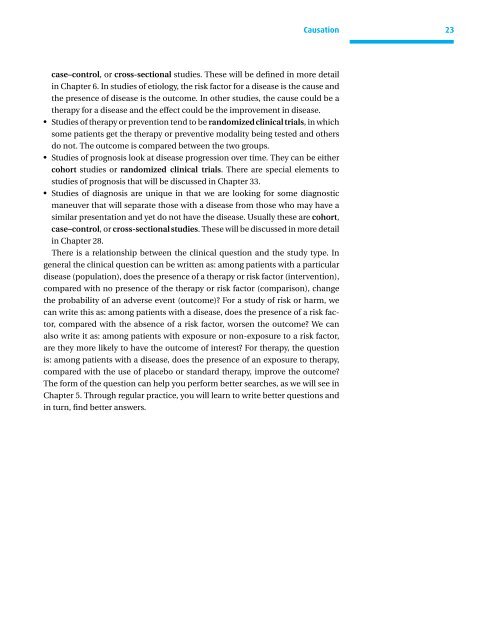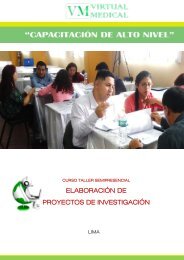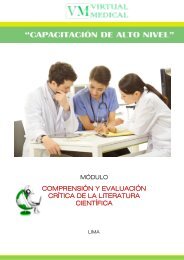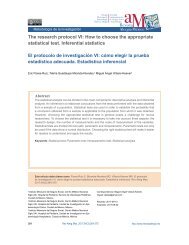- Page 2: Essential Evidence-Based Medicine S
- Page 5 and 6: cambridge university press Cambridg
- Page 7 and 8: vi Contents 17 Applicability and st
- Page 10 and 11: Preface In 1992 during a period of
- Page 12 and 13: Foreword The impact of evidence-bas
- Page 14 and 15: Acknowledgments There are many peop
- Page 16 and 17: 1 A brief history of medicine and s
- Page 18 and 19: A brief history of medicine and sta
- Page 20 and 21: A brief history of medicine and sta
- Page 22 and 23: A brief history of medicine and sta
- Page 24 and 25: 2 What is evidence-based medicine?
- Page 26 and 27: What is evidence-based medicine? 11
- Page 28 and 29: What is evidence-based medicine? 13
- Page 30 and 31: What is evidence-based medicine? 15
- Page 32 and 33: What is evidence-based medicine? 17
- Page 34 and 35: 3 Causation Heavier than air flying
- Page 36 and 37: Causation 21 Koch’s postulates st
- Page 40 and 41: The medical literature: an overview
- Page 42 and 43: The medical literature: an overview
- Page 44 and 45: The medical literature: an overview
- Page 46 and 47: The medical literature: an overview
- Page 48 and 49: 5 Searching the medical literature
- Page 50 and 51: Searching the medical literature 35
- Page 52 and 53: Searching the medical literature 37
- Page 54 and 55: Searching the medical literature 39
- Page 56 and 57: Searching the medical literature 41
- Page 58 and 59: Searching the medical literature 43
- Page 60 and 61: Searching the medical literature 45
- Page 62 and 63: Searching the medical literature 47
- Page 64 and 65: Searching the medical literature 49
- Page 66 and 67: Searching the medical literature 51
- Page 68 and 69: Searching the medical literature 53
- Page 70 and 71: Searching the medical literature 55
- Page 72 and 73: Study design and strength of eviden
- Page 74 and 75: Study design and strength of eviden
- Page 76 and 77: Study design and strength of eviden
- Page 78 and 79: Study design and strength of eviden
- Page 80 and 81: Study design and strength of eviden
- Page 82 and 83: 7 Instruments and measurements: pre
- Page 84 and 85: Instruments and measurements: preci
- Page 86 and 87: Instruments and measurements: preci
- Page 88 and 89:
Instruments and measurements: preci
- Page 90 and 91:
Instruments and measurements: preci
- Page 92 and 93:
Instruments and measurements: preci
- Page 94 and 95:
Instruments and measurements: preci
- Page 96 and 97:
Sources of bias 81 failed and ultim
- Page 98 and 99:
Sources of bias 83 researchers did
- Page 100 and 101:
Sources of bias 85 inclusion or not
- Page 102 and 103:
Sources of bias 87 this bias is to
- Page 104 and 105:
Sources of bias 89 assuming that mi
- Page 106 and 107:
Sources of bias 91 Table 8.1. Looki
- Page 108 and 109:
9 Review of basic statistics There
- Page 110 and 111:
Review of basic statistics 95 Mean
- Page 112 and 113:
Review of basic statistics 97 Stem
- Page 114 and 115:
Review of basic statistics 99 10 Fi
- Page 116 and 117:
Review of basic statistics 101 lowe
- Page 118 and 119:
Review of basic statistics 103 Fig.
- Page 120 and 121:
Review of basic statistics 105 Usin
- Page 122 and 123:
Review of basic statistics 107 Tabl
- Page 124 and 125:
10 Hypothesis testing Medicine is t
- Page 126 and 127:
Hypothesis testing 111 alternative
- Page 128 and 129:
Hypothesis testing 113 because a ne
- Page 130 and 131:
Hypothesis testing 115 Events of in
- Page 132 and 133:
Hypothesis testing 117 Frequency of
- Page 134 and 135:
Hypothesis testing 119 a person’s
- Page 136 and 137:
Type I errors and number needed to
- Page 138 and 139:
Type I errors and number needed to
- Page 140 and 141:
Type I errors and number needed to
- Page 142 and 143:
Type I errors and number needed to
- Page 144 and 145:
Type I errors and number needed to
- Page 146 and 147:
Negative studies and Type II errors
- Page 148 and 149:
Negative studies and Type II errors
- Page 150 and 151:
Negative studies and Type II errors
- Page 152 and 153:
Negative studies and Type II errors
- Page 154 and 155:
Negative studies and Type II errors
- Page 156 and 157:
13 Risk assessment We saw the risk
- Page 158 and 159:
Risk assessment 143 Direction of sa
- Page 160 and 161:
Risk assessment 145 Relative risk =
- Page 162 and 163:
Risk assessment 147 In the cohort s
- Page 164 and 165:
of the muscles of the body in an as
- Page 166 and 167:
Risk assessment 151 A user’s guid
- Page 168 and 169:
Risk assessment 153 Table 13.1. Act
- Page 170 and 171:
trust such as a doctor is less acce
- Page 172 and 173:
Adjustment and multivariate analysi
- Page 174 and 175:
Adjustment and multivariate analysi
- Page 176 and 177:
Adjustment and multivariate analysi
- Page 178 and 179:
Adjustment and multivariate analysi
- Page 180 and 181:
Randomized clinical trials 165 Dr.
- Page 182 and 183:
Randomized clinical trials 167 subj
- Page 184 and 185:
Randomized clinical trials 169 abso
- Page 186 and 187:
Randomized clinical trials 171 Tabl
- Page 188 and 189:
Randomized clinical trials 173 coul
- Page 190 and 191:
Randomized clinical trials 175 The
- Page 192 and 193:
Randomized clinical trials 177 Tabl
- Page 194 and 195:
16 Scientific integrity and the res
- Page 196 and 197:
Scientific integrity and the respon
- Page 198 and 199:
Scientific integrity and the respon
- Page 200 and 201:
Scientific integrity and the respon
- Page 202 and 203:
17 Applicability and strength of ev
- Page 204 and 205:
Applicability and strength of evide
- Page 206 and 207:
Applicability and strength of evide
- Page 208 and 209:
Applicability and strength of evide
- Page 210 and 211:
Applicability and strength of evide
- Page 212 and 213:
Applicability and strength of evide
- Page 214 and 215:
18 Communicating evidence to patien
- Page 216 and 217:
Communicating evidence to patients
- Page 218 and 219:
Communicating evidence to patients
- Page 220 and 221:
Communicating evidence to patients
- Page 222 and 223:
Communicating evidence to patients
- Page 224 and 225:
Critical appraisal of qualitative r
- Page 226 and 227:
Critical appraisal of qualitative r
- Page 228 and 229:
Critical appraisal of qualitative r
- Page 230 and 231:
20 An overview of decision making i
- Page 232 and 233:
An overview of decision making in m
- Page 234 and 235:
An overview of decision making in m
- Page 236 and 237:
An overview of decision making in m
- Page 238 and 239:
An overview of decision making in m
- Page 240 and 241:
An overview of decision making in m
- Page 242 and 243:
An overview of decision making in m
- Page 244 and 245:
An overview of decision making in m
- Page 246 and 247:
An overview of decision making in m
- Page 248 and 249:
21 Sources of error in the clinical
- Page 250 and 251:
Sources of error in the clinical en
- Page 252 and 253:
Sources of error in the clinical en
- Page 254 and 255:
Sources of error in the clinical en
- Page 256 and 257:
Sources of error in the clinical en
- Page 258 and 259:
Sources of error in the clinical en
- Page 260 and 261:
The use of diagnostic tests 245 rea
- Page 262 and 263:
(ii) Blood culture for bacteremia.
- Page 264 and 265:
23 Utility and characteristics of d
- Page 266 and 267:
Utility and characteristics of diag
- Page 268 and 269:
Utility and characteristics of diag
- Page 270 and 271:
Utility and characteristics of diag
- Page 272 and 273:
Utility and characteristics of diag
- Page 274 and 275:
Utility and characteristics of diag
- Page 276 and 277:
24 Bayes’ theorem, predictive val
- Page 278 and 279:
Bayes’ theorem and predictive val
- Page 280 and 281:
Bayes’ theorem and predictive val
- Page 282 and 283:
Bayes’ theorem and predictive val
- Page 284 and 285:
Bayes’ theorem and predictive val
- Page 286 and 287:
Bayes’ theorem and predictive val
- Page 288 and 289:
Bayes’ theorem and predictive val
- Page 290 and 291:
Bayes’ theorem and predictive val
- Page 292 and 293:
Comparing tests and using ROC curve
- Page 294 and 295:
Comparing tests and using ROC curve
- Page 296 and 297:
Comparing tests and using ROC curve
- Page 298 and 299:
Incremental gain and the threshold
- Page 300 and 301:
Incremental gain and the threshold
- Page 302 and 303:
Incremental gain and the threshold
- Page 304 and 305:
Incremental gain and the threshold
- Page 306 and 307:
Incremental gain and the threshold
- Page 308 and 309:
Incremental gain and the threshold
- Page 310 and 311:
27 Sources of bias and critical app
- Page 312 and 313:
Sources of bias and critical apprai
- Page 314 and 315:
Sources of bias and critical apprai
- Page 316 and 317:
Sources of bias and critical apprai
- Page 318 and 319:
Sources of bias and critical apprai
- Page 320 and 321:
Sources of bias and critical apprai
- Page 322 and 323:
Sources of bias and critical apprai
- Page 324 and 325:
Sources of bias and critical apprai
- Page 326 and 327:
Screening tests 311 Onset of diseas
- Page 328 and 329:
so low in this population that even
- Page 330 and 331:
Screening tests 315 No screening On
- Page 332 and 333:
Screening tests 317 Table 28.2. Scr
- Page 334 and 335:
not want the treatment. You should
- Page 336 and 337:
Practice guidelines and clinical pr
- Page 338 and 339:
Practice guidelines and clinical pr
- Page 340 and 341:
Practice guidelines and clinical pr
- Page 342 and 343:
Practice guidelines and clinical pr
- Page 344 and 345:
Practice guidelines and clinical pr
- Page 346 and 347:
Practice guidelines and clinical pr
- Page 348 and 349:
30 Decision analysis and quantifyin
- Page 350 and 351:
Decision analysis and quantifying p
- Page 352 and 353:
Decision analysis and quantifying p
- Page 354 and 355:
Decision analysis and quantifying p
- Page 356 and 357:
Decision analysis and quantifying p
- Page 358 and 359:
Decision analysis and quantifying p
- Page 360 and 361:
Decision analysis and quantifying p
- Page 362 and 363:
Decision analysis and quantifying p
- Page 364 and 365:
Decision analysis and quantifying p
- Page 366 and 367:
treatment costs more and is clearly
- Page 368 and 369:
Cost-effectiveness analysis 353 com
- Page 370 and 371:
Cost-effectiveness analysis 355 Tab
- Page 372 and 373:
Cost-effectiveness analysis 357 att
- Page 374 and 375:
32 Survival analysis and studies of
- Page 376 and 377:
Survival analysis and studies of pr
- Page 378 and 379:
Survival analysis and studies of pr
- Page 380 and 381:
Survival analysis and studies of pr
- Page 382 and 383:
33 Meta-analysis and systematic rev
- Page 384 and 385:
Meta-analysis and systematic review
- Page 386 and 387:
Meta-analysis and systematic review
- Page 388 and 389:
Meta-analysis and systematic review
- Page 390 and 391:
Meta-analysis and systematic review
- Page 392 and 393:
Meta-analysis and systematic review
- Page 394 and 395:
Levels of evidence Therapy/Preventi
- Page 396 and 397:
c By poor-quality cohort study we m
- Page 398 and 399:
Appendix 1: Levels of evidence and
- Page 400 and 401:
Appendix 2: Overview of critical ap
- Page 402 and 403:
Appendix 3 Commonly used statistica
- Page 404 and 405:
Appendix 4 Formulas Descriptive sta
- Page 406 and 407:
Appendix 4: Formulas 391 95% confid
- Page 408 and 409:
Appendix 5: Proof of Bayes’ theor
- Page 410 and 411:
Appendix 6: Using balance sheets to
- Page 412 and 413:
Glossary 397 Arm (of decision tree)
- Page 414 and 415:
Glossary 399 Critical appraisal The
- Page 416 and 417:
Glossary 401 False negative (FN) Pa
- Page 418 and 419:
Glossary 403 Intrinsic characterist
- Page 420 and 421:
Glossary 405 Outcomes study a perio
- Page 422 and 423:
Glossary 407 Quality of life A comp
- Page 424 and 425:
Glossary 409 Statistical significan
- Page 426 and 427:
Bibliography Common medical journal
- Page 428 and 429:
Bibliography 413 There has been a r
- Page 430 and 431:
Bibliography 415 Department of Clin
- Page 432 and 433:
Bibliography 417 Moses, L. E. Stati
- Page 434 and 435:
Bibliography 419 Bucher, H. C., Guy
- Page 436 and 437:
Bibliography 421 Richardson, W. S.,
- Page 438 and 439:
Bibliography 423 NHS Centre for Rev
- Page 440 and 441:
Index Locators in italic refer to f
- Page 442 and 443:
Index 427 chance nodes 336, 336 chi
- Page 444 and 445:
Index 429 pattern recognition 228-9
- Page 446 and 447:
Index 431 quotation 9 steps in prac
- Page 448 and 449:
Index 433 inferential statistics 94
- Page 450 and 451:
Index 435 methods 28, 29, 171, 304-
- Page 452 and 453:
Index 437 positive likelihood ratio
- Page 454 and 455:
Index 439 retrospective bias 368 re
- Page 456 and 457:
Index 441 surrogate markers 20, 59,


















